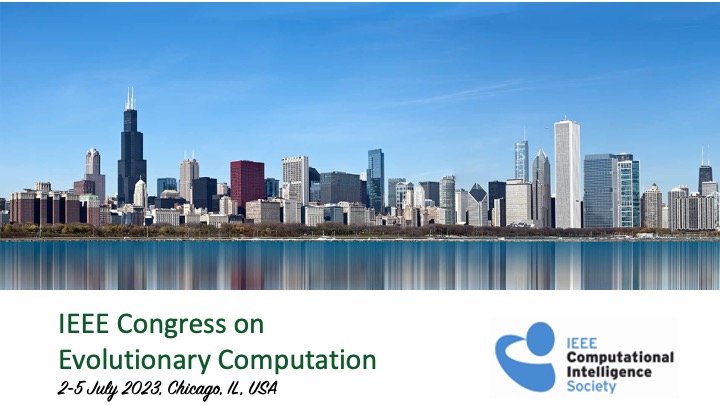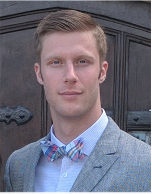Special Session:
Optimization Methods for Bioinformatics and Bioengineering
2023 IEEE Congress on Evolutionary Computation (CEC 2023)
Conference dates: July 2th to 5th 2023
Paper submission deadline: January 27th 2023
Chicago, USA
Organizers
Shouyong Jiang
University of Aberdeen, UK
James Hughes
St. Francis Xavier University, Canada
Allmendinger Richard
The University of Manchester, UK
Scope and call for papers
This special session invites papers discussing recent advances in the development and application of Optimization, Learning, and Decision-Making in Bioinformatics and Bioengineering.
Bioinformatics and Bioengineering (BB) are interdisciplinary scientific fields involving many branches of computer science, engineering, mathematics, and statistics. Bioinformatics is concerned with the development and application of computational methods for the modeling, retrieving and analysis of biological data, while Bioengineering is the application of engineering techniques to biology so as to create usable and economically viable products.
Bioinformatics and Bioengineering are relatively new fields in which many challenges and issues can be formulated as (single and multiobjective) optimization problems. These problems span from traditional problems, such as the optimization of biochemical processes, construction of gene regulatory networks, protein structure alignment and prediction, to more modern problems, such as directed evolution, drug design, experimental design, and optimization of manufacturing processes, material and equipment.
We encourage submission of papers describing new optimization strategies / challenges / applications / decision-making techniques in this area. While we are interested in fundamental algorithmic advancements in this area, we emphasize that we also welcome application papers discussing the power and applicability of these methods to real-world problems in Bioinformatics and Bioengineering. You are invited to submit papers that are unpublished original work for this special session at IEEE CEC2023.
The main aim of this special session is to bring together both experts and new-comers working on Optimization Methods in Bioinformatics and Bioengineering to discuss new and exciting issues, and explore cutting edge advancements in this area.
This session is supported by the IEEE CIS Bioinformatics and Bioengineering Technical Committee (BBTC) and the IEEE CIS Task Force on Optimization Methods in Bioinformatics and Bioengineering.
Topics of Interest
- (Single and multiobjective) optimization techniques for Bioinformatics and Bioengineering (BB) problems
- Evolutionary algorithms
- Swarm intelligence
- Metaheuristics
- Expensive (Bayesian) optimization
- Hybrid optimization algorithms (combinations of heuristics and exact methods, hybridization of heuristics and machine learning)
- Decision-making techniques and MCDM for BB problems
- Preference elicitation and representation
- Aggregation-based techniques
- Experimental optimization of BB problems
- Experimental optimization problems
- Closed-loop optimizatin challenges and applications
- Resourcing issues (interruptions, missing objective function values, changes of variables, etc)
- Treatment optimization
- Emerging topics in Bioinformatics and Bioengineering
- Novel applications (process design, manufacturing, etc)
- Novel challenges (e.g. large-scale problems, dynamic problems, mixed integer problems, uncertainty, expensive and limited evaluations, etc)
- Bilevel and multilevel optimization
- Interactive visualization techniques/analysis and vilusalization of large biological data sets
- Multi-objective data mining
- Predictive finitness landscape design
- Many-objective optimization, learning, and decision-making
- Ecoinformatics
- Side effect machines and other kernal representations for sequence analysis
- Biomedical data modelling and ming
- Explainable optimization and decision in biology
- Learning in/from the optimization of BB problems
- Link between Decision Maker's learning and model's learning
- Capturing and learning from user preferences
- Integrating optimization with machine learning
- Interactive learning and optimization techniques
- Techniques for learning user-driven parameter settings from examples
- Tuning of optimization, learning and decision-making techniques for BB problems
- Performance measures
- Test and benchmark problems
- (Interactive) visualization techniques
- Optimization and visualization software
- Interpretability/explainability techniques
- Applications
- Systems biology
- Synthetic biology
- Brain computer interface
- Computational proteomics
- Emergent properties in complex biological systems
- Gene expression array analysis
- Gene finding
- Genetic networks
- High-throughput data analysis
- In-silico optimization of biological systems
- Immuno- and chemo-informatics
- Medical image analysis
- Medical imaging and pattern recognition
- Medicine and health informatics
- Metabolic pathway analysis
- Microarray design or oligonucleotide selection
- Molecular docking and drug design
- Molecular evolution and phylogenetics
- Molecular sequence alignment and analysis
- Motif and signal detection
- Robustness and evolvability of biological networks
- Single nucleotide polymorphism (SNP) analysis
- Structure prediction and folding
- Visualization and analysis of single-cell RNA-seq data
- Biological network inference using omics data
- Retrosynthesis pathway design
- Calibration of biological models
- Inference of biological objectives using omics data
- Biosystem identification
- Reverse engineering
Submission instructions
We welcome original contributions describing ongoing projects or completed work. The instructions for authors, and LaTeX and Word templates can be found at https://2023.ieee-cec.org/paper-submission.
Important dates
Paper submission:
January 27, 2023
Paper Reviews: March 17, 2023
Final Submission: April 29, 2023
Program committee
Ashlock Daniel, University of Guelph, Canada
Ashlock Wendy, Ashlock & McGuinness Consulting Inc, Canada
Auephanwiriyakul Sansanee, Chiang Mai University, Thailand
Brown Joseph, Innopolis University, Russia
Corns Steven, Missouri University, USA
Fogel Gary, Natural Selection Inc, USA
Handl Julia, University of Manchester, UK
Houghten Sheridan, Brock University, Canada
Jin Yaochu, University of Surrey, UK
Langdon Bill, University College London, UK
Lavygina Anna, Manchester Metropolitan University, UK
Lozano Jose, University of the Basque Country UPV/EHU, Spain
Plagianakos Vassilis, University of Central Greece, Greece
Rombo Simona, University of Palermo, Italy
Ruz Gonzalo, Universidad Adolfo Ibanez, Chile
Contact
Please feel free to contact us
Shouyong Jiang: shouyong.jiang@abdn.ac.uk
James Hughes: jhughes@stfx.ca
Richard Allmendinger: richard.allmendinger@manchester.ac.uk
About the organizers
|
|
Shouyong Jiang
received the B.Sc. degree in information and computation science and the M.Sc. degree in control theory and control engineering
from Northeastern University, China, respectively, and the Ph.D. degree in computer science from De Montfort University, UK.
He is now a Lecturer in Computer Science at the University of Aberdeen, UK. He was a recipient of IEEE CIS Outstanding PhD Dissertation Award.
He has 50 publications in relevant research fields including computational intelligence, bioinformatics and data science. His current research
interests include evolutionary computation, machine learning, systems biology, computational modeling, and AI techniques to applied areas including
biotechnology, agriculture, and healthcare.
|
|
|
James Hughes is an
completed his BSc honours at Brock University studying Computer Science and Physics in December 2012. He defended his MSc degree in Computer Science
focusing on Bioinformatics at Brock under the supervision of Dr. Sheridan Houghten in August 2014. James moved to London Ontario to pursue his PhD
at the University of Western Ontario where he studied Computer Science, Artificial Intelligence, and Neuroinformatics under the supervision of Dr. Mark
Daley. James defended his thesis in July 2018 and began his appointment at St. Francis Xavier University in August 2018. James’ interests include the
development of machine learning algorithms for real world applications. Although he is interested in many algorithms, particular strategies of interest
are Evolutionary Computation and Artificial Neural Networks. Application areas include neuroinformatics, bioinformatics, kinematics, geology, art,
finance, and clinical applications.
|
|
|
Richard Allmendinger is Professor of Applied AI and the Business Engagement Lead of Alliance
Manchester Business School, The University of Manchester, and Fellow of The Alan Turing Institute, the UK's national institute for data science and
artificial intelligence. Richard has a background in Business Engineering (Diplom, Karlsruhe Institute of Technology, Germany + Royal Melbourne Institute
of Technology, Australia), Computer Science (PhD, The University of Manchester, UK), and Biochemical Engineering (Research Associate, University College
London, UK). Richard's research interests are in the field of data and decision science and in particular in the development and application of optimization,
learning and analytics techniques to real-world problems arising in areas such as management, engineering, healthcare, sports, music, and forensics. Richard
is known for his work on non-standard expensive optimization problems comprising, for example, heterogeneous objectives, ephemeral resource constraints,
changing variables, and safe optimization environments. Much of his research has been funded by grants from various UK funding bodies (e.g. Innovate UK,
EPSRC, ESRC, ISCF) and industrial partners. Richard is a Member of the Editorial Board of several international journals, Vice-Chair of the IEEE CIS
Bioinformatics and Bioengineering Technical Committee, Co-Founder of the IEEE CIS Task Force on Optimization Methods in Bioinformatics and Bioengineering,
and contributes regularly to conference organisation and special issues as guest editors.
|



